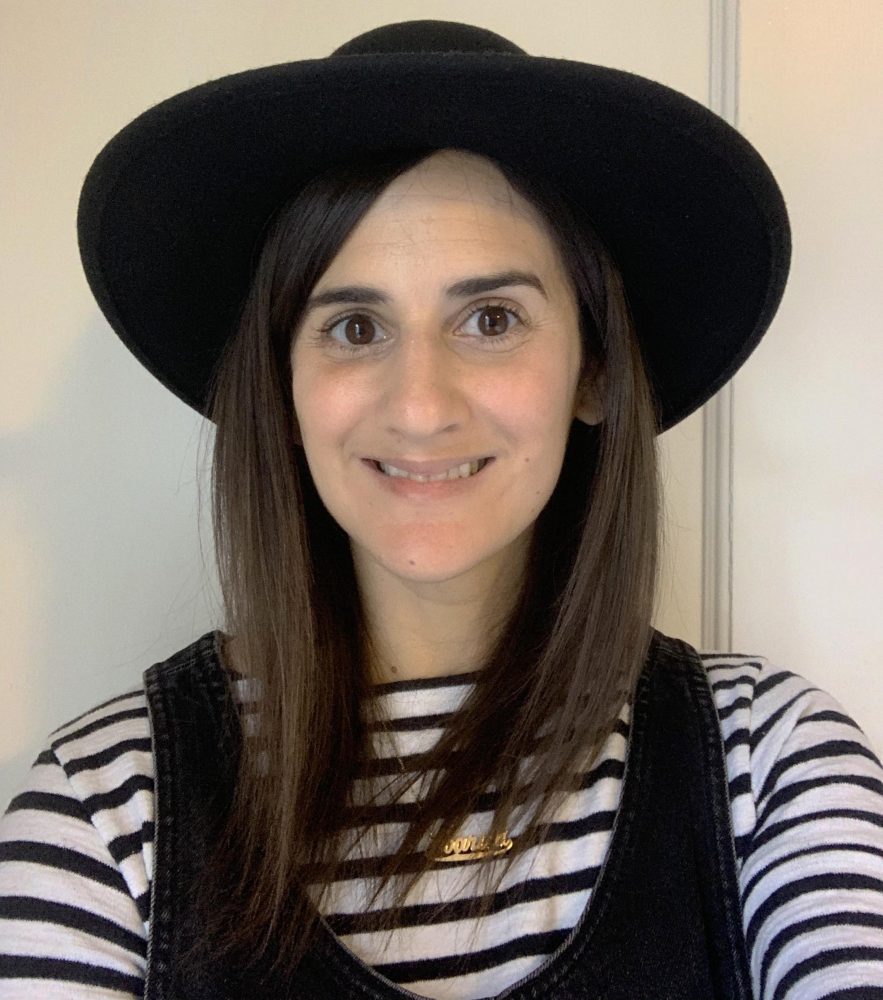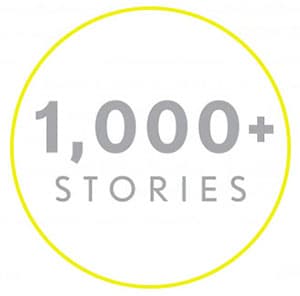
When Marisa Sheff became familiar with the needs of the homeless community working as a volunteer in Toronto, Canada, she committed herself to finding a way to help. Upon learning that socks were one of the most needed items in shelters, her social enterprise Sock Footage was born. Sock Footage is an online subscriptions and retail store concept with a one for one giving model; every pairs of socks purchased results in a pair donated. Over the last two years, Sheff has marveled at how her customers have found ways to become even more involved in helping the homeless and has pushed herself to overcome challenges posed by the Pandemic: like relocated her sock vending machine to a spot with more foot traffic, to hosting her very first webinar.
Sheff’s story, as told to The Story Exchange 1,000+ Stories Project:
Sock Footage was born out of a desire to combine my passion for socks with an opportunity to give back to those in need. After learning that socks were one of the most needed but least donated items to homeless shelters, I wanted to use my industry experience to help reduce some of the stigma associated with those living on the streets.
For every pair of socks purchased from our site or from our charitable sock vending machine, a complimentary pair of donation socks is provided, to encourage individuals to get out there and give (whether face-to-face or via our partner charity). Through my volunteer work, which awarded me the opportunity to engage with members of the homeless community, I quickly realized that there was a common thread among the individuals with whom I crossed paths: they all craved connection and conversation. They wanted to be heard and they wanted to be seen. Unfortunately, in this age of technology, we have lost authentic connection, and as a result, many of our relationships have become short-lived and transactional.
For me it was important to get people reconnecting with their respective communities, which is why I have taken my company’s model one step further (pun intended) in giving consumers the option to donate directly to someone living on the streets. I created our #PAYITFOOTWARD initiative to encourage people to share highlights of their donation experiences in the hopes that it would help others step outside their comfort zones and opt to give in person.
[Related: This International Women’s Day, Meet the 22-Year-Old Climate Activist From Pakistan]
When I first launched the company, one of my customers ordered funky socks and opted to have the corresponding donation socks shipped out with her order to be able to hand them out with her kids. Their overall giving experience was such a positive one that, as a family, they wanted to find new ways to give beyond just socks. They separately organized an initiative in their community where they were then able to collect a whole range of supplies (toothpaste, deodorant, sanitizer, etc.) and put together 150 care packages for people living on the streets.
Another customer ordered one of our sock subscription packages, and in her first month, she asked that we donate the free pair of socks on her behalf, in her second month, she had a change of heart and reached out to see if I could ship out her free donation socks with her order. In approaching a few individuals who were “living rough” in her area, she decided to ask them what else they could use and promised to return with additional provisions in the coming weeks.
It is this domino effect of kindness that fuels me to continue to do this important work and spread awareness about the importance of giving back. If I can put a smile on someone’s face while teaching others the true definition of compassion, to me that is the ultimate success.
My biggest success to date has been coordinating, organizing and moderating my first webinar to help emphasize the importance of corporate community engagement in the workplace. As a small business owner and founder of a social enterprise, I believe that it is my responsibility to help educate others on some of the challenges facing the homeless community as a whole. I was able to secure an amazing keynote speaker with lived homelessness experience who provided his perspective on the impact that giving and kindness can have on those on the receiving end. I was also able to showcase the important work of a local charitable organization, whose Executive Director was generous enough to volunteer his time to speak to what they needed most during the pandemic.
I am really proud of the work that was done to put this together, as it forced me to step outside of my own comfort zone. The feedback post-event was extremely positive. I am told that attendees left feeling inspired and had a better understanding and perspective as it related to one of our city’s most vulnerable populations.
My top challenge was navigating the early road to entrepreneurship. I decided that I was going to develop the first customized charitable sock vending machine in Canada. This project was completely outside of my wheelhouse, as career-wise, I had always worked in sales. I took the initiative to connect with a vending machine distributor, learned the backend through training, etc., worked on customization based on my vision (after having been told repeatedly that what I wanted was not possible) and eventually rolled out the launch of the machine.
[Related: Steering a 100-Year-Old Family Fish Business Through Murky Pandemic Waters]
There have definitely been a fair share of challenges along the way including vandalism to the machine, socks getting stuck, and the pandemic forcing me to find a new location with a decent amount of traffic, but I took each challenge as an opportunity to grow and learn. This machine had been a passion project of mine, well before the website even launched and continues to be a testament to hard work and perseverance in the face of adversity. The machine initially launched into my alma-mater, Ryerson University in downtown Toronto, but now lives in a mall just outside of the city.
My most important role model is definitely my grandfather, Martin. He is 94 years old and has only ever worked for himself. Despite his age, he has always made a point to stay up to date with current events and technology, which has given him a leg up on the competition. He recently told me that were it not for poor eyesight, he would have 100% been on social media. In university, my friends would marvel at the fact that him and I would correspond using MSN messenger, and he was the first one in our family to get an iPhone. A true entrepreneur and a holocaust survivor, he has shown me time and time again that anything is possible if you believe in yourself.
Check out our Advice + Tips for entrepreneurs starting-up
Watch our latest videos
Subscribe to our podcast


